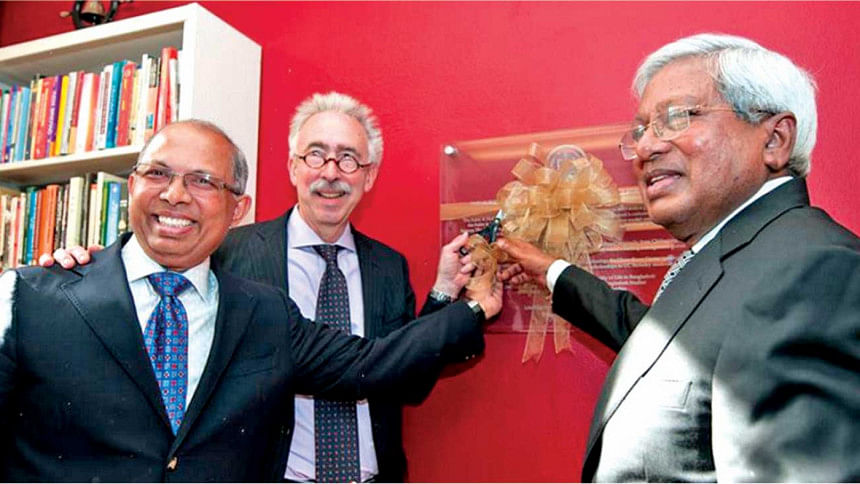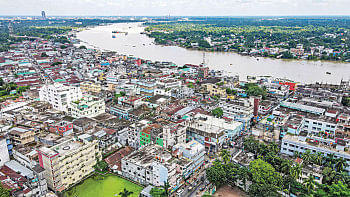FIRST BANGLADESH STUDIES CENTER IN US, AT UC BERKELEY

Monday, March 30, marked the official opening of UC Berkeley's Subir and Malini Chowdhury Center for Bangladesh Studies.
Endowed by the Subir and Malini Chowdhury Foundation, Berkeley's Bangladesh Center is the first of its kind outside of Bangladesh. The seed funding provided by the Chowdhury's will support, among other things, public lectures, conferences and symposiums to encourage collaboration among researchers and offer undergraduate scholarships and graduate fellowships.
UC Berkeley Chancellor Nicholas Dirks presided over the invitation-only ribbon-cutting at the campus's Institute for South Asia Studies, accompanied by a rendition of the Bangladesh national anthem by Wahida Rashid, a UC Berkeley alumna, and assembled Bangladeshis.
The Bangladeshi Ambassador to the US, His Excellency Mohammed Ziauddin, in a congratulatory note on the occasion, thanked Subir Chowdhury and the university and wished the center great success.
The ceremony was followed by an open-to-all lecture, "A Quiet Revolution in Bangladesh," by Sir Fazle Hasan Abed, founder and CEO of BRAC, considered the world's largest NGO as measured by number of employees and number of people served, and with a reach beyond Bangladesh.
Sanchita Saxena, the inaugural director of the Chowdhury Center and a noted scholar of labor issues in the garments sector, in introducing Sir Fazle Abed, noted the tremendous positive developmental turn-around by Bangladesh and the role BRAC has played in it.
Prof. Ananya Roy who moderated the Q&A session noted the importance of the BRAC model adding that she utilizes it in her teaching and coursework.
Ahmed Badruzzaman, an energy scientist and a member of the advisory board of the center, who was instrumental in bringing Sir Fazle for the inauguration, noted Sir Fazle's going "above and beyond" by postponing a BRAC Board meeting in order to come for the occasion.
Subir Chowdhury, a management consultant and a quality guru, whose foundation provided the $1 million gift that made the center possible, in his remarks, noted that the BRAC model that Sir Fazle described in his talk is what quality is all about.
The launch of the center closes a two-decade circle for Chowdhury and Raka Ray, chair of the Department of Sociology and professor of South and Southeast Asia studies at UC Berkeley. Ray's 1993 plea to Chowdhury, for help in establishing a Bangla language program, led to his crucial donation.
Dr. Saxena, also executive director of the Institute of South Asia Studies, the larger campus unit that houses the Chowdhury Center, noted that the establishment of the Chowdhury Center had come at the perfect time.
Judging by what Berkeley's Bangladesh center has already accomplished in the short time since it's establishment in 2013, we can be sure, said Dr. Saxena, that the research produced through the Chowdhury Center will not only help us to think about ways to combat the many challenges that the country is currently facing, but it will also offer us opportunities to learn from Bangladesh and envision how it can serve as a model for innovation and development.
In the long run, we can be confident that Berkeley's Bangladesh Center will emerge as a major hub for Bangladesh Studies in the United States and will become, in the words of founder Subir Chowdhury, "an independent global voice positively affecting the quality of life of people in Bangladesh."
With input from coverage of the center by Elaina Provencio, Staff Writer at UC Berkeley's student newspaper, The Daily Californian, Thomas Levy, Staff Writer at the UC Berkeley News Center, and Kathleen Maclay, UC Berkeley Media Relations.

 For all latest news, follow The Daily Star's Google News channel.
For all latest news, follow The Daily Star's Google News channel. 



Comments